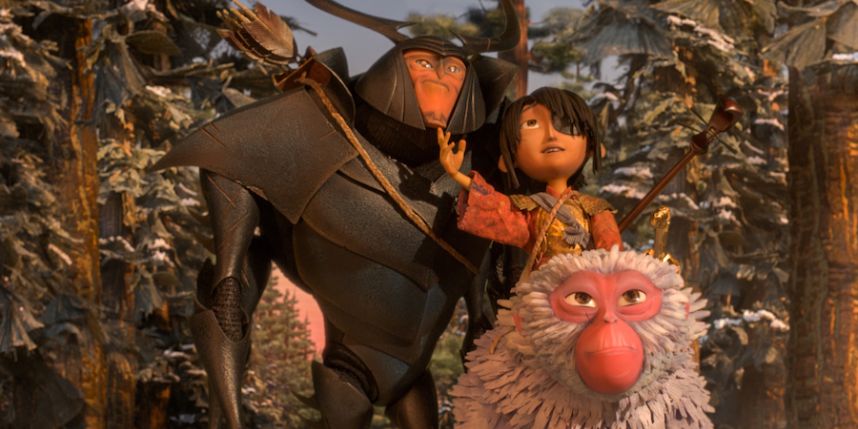‘Kubo and the Two Strings’ Who in 2016 makes a somber stop-motion animated movie set in Ancient Japan where one of the heroes is a Samurai beetle? “Kubo and the Two Strings” is the latest from Laika, the little animation house that could, and has. They’re not Pixar, nor Dreamworks, nor whatever the soulless one at Fox is called. But working just slightly under the radar, they’ve distinguished themselves as the strangest toon mavens in the mainstream, cranking out oddities from Neil Gaiman books (“Coraline”) and about ghosts (“ParaNorman”) and trolls that wear boxes as clothes (“The Boxtrolls”). “Kubo” is Laika’s hardest sell yet and, not coincidentally, their most assured and lovely effort. Crafting an original myth out of spare parts of Japanese history, it relates the tale of a one-eyed boy (voice of “Game of Thrones” munchkin Art Parkinson) who wields a cool eye-patch and mysterious powers that turn him into a literal guitar god. Kubo finds himself on the run, pursued by evil entities, namely his menacing, masked aunts (both voiced by Rooney Mara in a blood-curdling flatness impressive even for her) and his evil wizard of a grandfather (Ralph Fiennes). This is a more serious romp than past Laikas, but it’s still loopy and weird. To wit: To Kubo’s aid come a severe, talking monkey (Charlize Theron) and the aforementioned, joke-flinging insect warrior (Matthew McConaughey). Unburdened by fidelity to some comic book or old franchise, “Kubo” is free to let is freak flag fly, gifting us with sights that blend for-real puppets with light digital touch-ups. You get caves that sport skull entrances, sea monsters with giant eyeballs and a ship made out of magic origami — all of it comin’ at ya in 3-D that’s actually worth the inflated ticket price. Ordinarily, a movie about Asian culture made in a warehouse in Oregon and stacked with mostly Western voices would be #problematic. But we’ll give “Kubo” a pass, not only because it’s lush and gorgeous but because it betrays obvious respect and love for its far-off land. Its dedication to Buddhist beliefs isn’t shallow cultural appropriation; it understands it deep in its bones. It’s a reverie about grief and loss and the idea that people don’t die so long as their stories live on. That might make “Kubo” sound stuffy, even brainy, when it’s actually fleet and masterful. Even if it has no interest in birthing a franchise, it deserves to live on as an instant classic.
Director: Travis Knight
Voices of: Art Parkinson, Charlize Theron
Rating: PG
4 (out of 5) Globes
‘Kubo and the Two Strings’ is a lush and loopy instant classic

Laika Studios, Focus Features
Follow Matt Prigge on Twitter @mattprigge


















